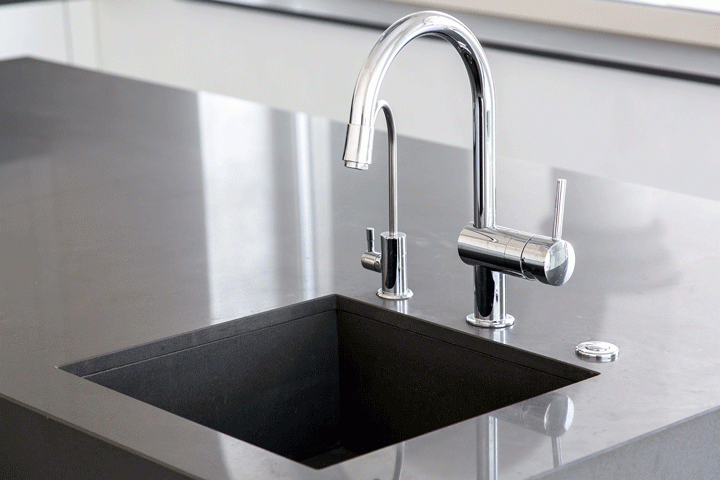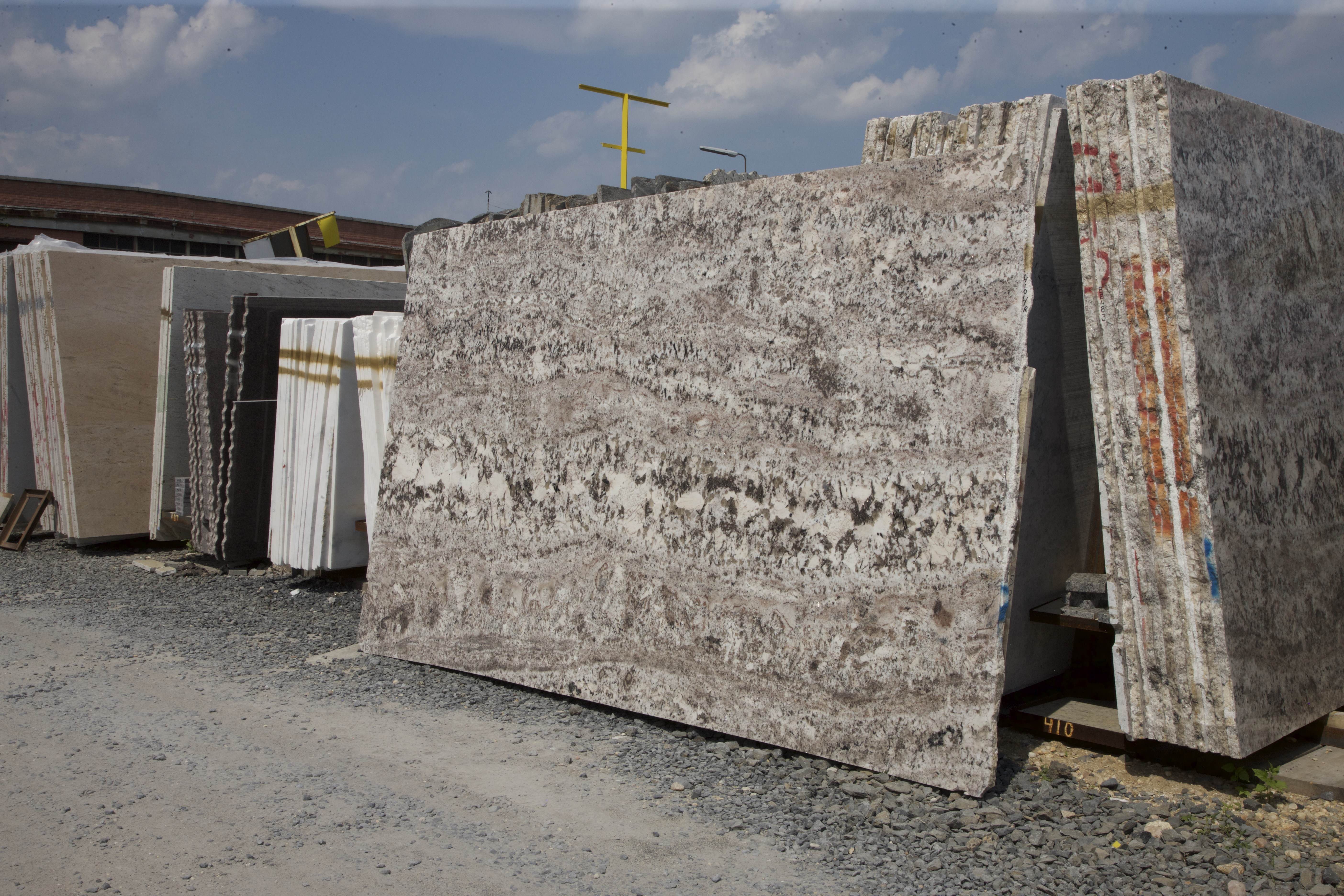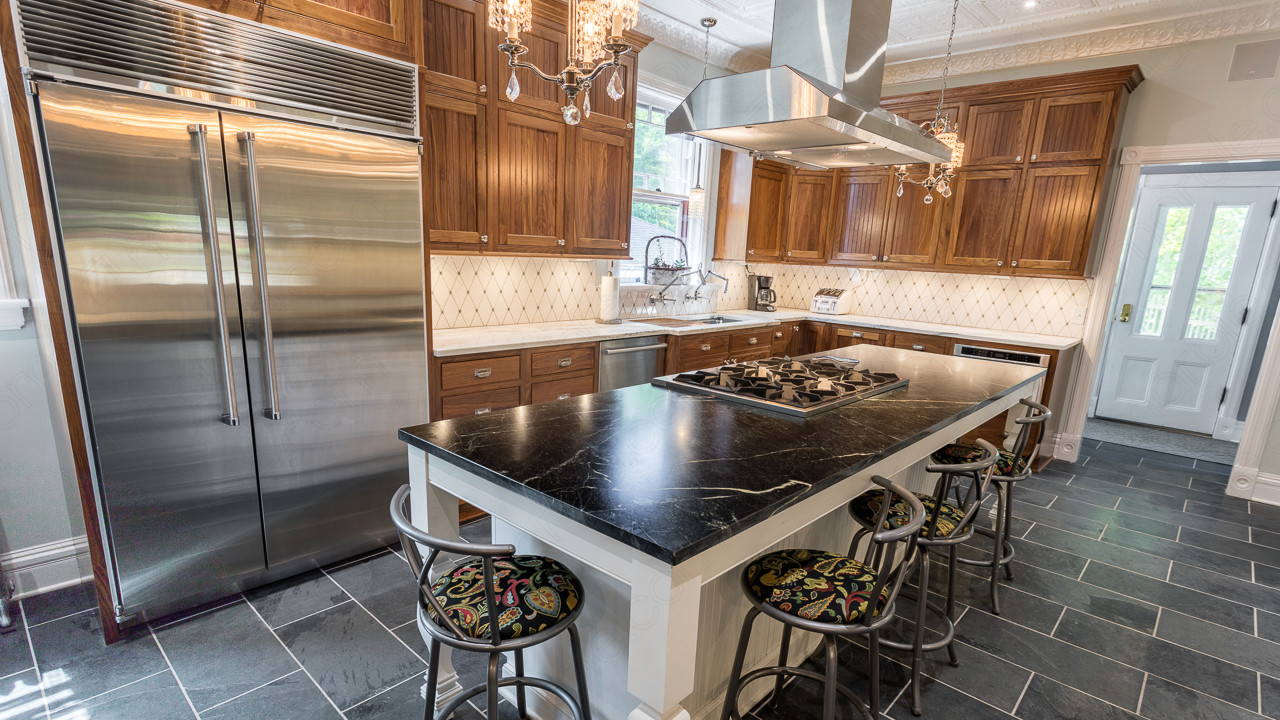Table of Contents

Kitchens can be a treacherous place for stone countertops. They are a high traffic area where sharp objects, spills, and messes are more frequent to occur. That is why it is important to have a stone that can handle those messes while also being easy to clean. Of course, we are talking about quartz countertops.
Quartz countertops have risen in popularity with home renovations and professional interior design, and they are possibly one of the top three most popular stones on the market. However, as great as quartz countertops are, they still need to be properly cleaned and cared for if they will last your lifetime.
That is why we are going to give you a complete guide on how to clean quartz kitchen countertops, including general care, stains, and overall maintenance tips.
Why Is Quartz Easy To Clean
Quick rundown before we get into the details of cleaning, but quartz countertops are not a “pure” stone. Quartz countertops are considered an engineered stone since they are composed of 90-93% quartz mineral, with the remaining 7-10% being a polymerized resin attaching it together. The mineral and resin are pressed together, dyed, then sealed to be sold.
Thanks to the unique manner of fabrication, quartz countertops are much stronger than several natural stones. Quartz countertops do not have the same weaknesses of pores, re-sealing, and softness, making them great for busy homes or professional projects. Without any pores, spills cannot seep into the stone, simply remaining on the surface to be easily wiped away.
Since quartz can be dyed a variety of colors, it is an excellent alternative to premium stones like marble. Granted, quartz countertops can be a bit expensive as well, but in many cases, you will be saving some money and purchasing a sturdier product, which is always a benefit.
[get_quote]
General Care Cleaning Supplies
These supplies are used for general cleanings but can also be used to remove stains as well. Quartz countertops do not have any pores so all the spills and moisture accumulation from the kitchen will set on the surface of the stone without sinking into its depths.
|
Material |
Quantity |
Purpose |
|
Soft Microfiber Cloth |
2 |
Soft cloths are gentler with less abrasive edges to reduce the chances of dulling the countertops sheen in cleanings. |
|
Mild Dish Soap |
1 bottle |
A mild or soft dish soap does not contain as much acidic animal fat as regular cleaning products, reducing the chances of dulling the countertops sheen in cleanings. |
|
Warm Water |
1 bucket / spray bottle |
Used to dilute the soap for easy cleaning. Avoid using scalding hot or brittle cold as it can cause thermal shock if conditions are right. |
|
Stone Specific Cleaner |
1 bottle |
Can be interchangeable with the mild dish soap. Using a specific quartz or stone countertop cleaners are designed to clean stone countertops without side effects of dulling or etching. |
Thermal shock is the phenomenon characterized by a rapid change in temperature, resulting in strains on an object. Imagine, pouring hot water on a car windshield to melt the snow. The glass has adjusted to the icy temperatures, and pouring hot water to melt the water creates a drastic change in temperature which the glass cannot support, causing it to crack or shatter. The same situation can happen with stone countertops if the temperature change is dramatic. It is safer for quartz countertops if warm water is used in the cleaning process. Not too hot, not too cold, just right in the middle.
Quartz General Cleaning Instructions
Step 1: Clear the countertops of any loose materials or items. The surface should be free of any utensils, cups, plates, placemats, pots and pans, and items that will interfere with seeing the surface or edges.
Step 2: Mix water and dish soap together in a bucket or spray bottle. A few drops of soap in a water filled spray bottle is enough for most cases, but for deep cleanings, a bucket of water and a few drops of soap can work as well. Alternatively, a stone specific cleaner like Stone Tech, Weiman, or Superior Zero can be used without mixing anything.
Note: check with your quartz supplier with what cleaning agents they recommend using on their product.
Step 3: Spray the countertop with the chosen cleaning solution. A spray bottle makes the process much easier as it provides a larger spread without soaking the countertop. For anyone using a bucket, dip one of the soft cloths into the bucket, wring out excess water into the bucket before applying it to the countertop.
Step 4: Wipe down the countertop with the soft microfiber cloth. For the best results, wipe in small circles and work from the inside out. Continue spraying or re-dipping the cloth into the bucket if more solution is needed.
Step 5: Use the second microfiber cloth or towel to completely dry the countertop. There should not be any wet spots left after cleaning, as this can cause mineral stains later.
General Cleaning Effective On
The general cleaning guide is most effective for kitchen messes involving:
· Regular cleanings: crumbs, juices, jams, seasonings, condensation, spills, etc.
· Deep cleanings
· Dust removal
· Stain removal (food, water, grease, paint)
Disinfecting Quartz Countertop Supplies
Food is a common source for bacteria to develop. And if you are preparing a meal and some of the raw juices of chicken, pork, or beef spill onto the countertop, then that bacteria can linger and infect other foods. While a regular cleaning will suffice in removing most bacteria, sometimes it can be safe to use extra precautions.
|
Material |
Quantity |
Purpose |
|
Soft Microfiber Cloth |
2 |
Soft cloths are gentler with less abrasive edges to reduce the chances of dulling the countertops sheen in cleanings. |
|
Mild Dish Soap |
1 bottle |
A mild or soft dish soap does not contain as much acidic animal fat as regular cleaning products, reducing the chances of dulling the countertops sheen in cleanings. |
|
Warm Water |
1 bucket / spray bottle |
Used to dilute the soap for easy cleaning. Avoid using scalding hot or brittle cold as it can cause thermal shock if conditions are right. |
|
Stone Specific Cleaner |
1 bottle |
Can be interchangeable with the mild dish soap. Using a specific quartz or stone countertop cleaners are designed to clean stone countertops without side effects of dulling or etching. |
|
Rubbing Alcohol |
1 bottle |
When diluted, rubbing alcohol can be safe to remove bacteria, stains, and harder messes on stone countertops. |
Disinfecting Quartz Countertops Instructions
Step 1: Clear the countertop of any loose materials or items. To prevent the spread of any bacteria or infected contagions, it is safe to just keep everything clear, so the countertop has nothing on or around it.
Step 2: Choose your method cleaning
· Spray bottle: mix 2 cups of warm water, 1 drop of mild dish soap, 4 tablespoons of rubbing alcohol.
· Quartz Cleaner: ready to use.
· Bucket: fill with water, add 3-4 drops of dish soap, 1 cup of rubbing alcohol.
Step 3: Spray the countertop with the chosen cleaning solution. A spray bottle makes the process much easier as it provides a larger spread without soaking the countertop. For anyone using a bucket, dip one of the soft cloths into the bucket, wring out excess water into the bucket before applying it to the countertop.
Step 4: Wipe down the countertops in small circles, re-applying the cleaning solution as needed to remove any dirt spots or cover wider areas.
Step 5: Use the second microfiber cloth or towel to completely dry the countertop. Do not let air dry as any miniscule water spots left behind could create water stains.
Disinfecting Cleaning Effective On
While general cleanings are useful for routine care and removing some small stains, disinfecting is much stronger and a better option against:
· Stains (paint, food, water)
· Bacteria removal
· General sanitation from a contagious illness
Cleaning Quartz Countertop Stain Supplies
We stated many times already that quartz does not stain as easily as other stones. While that is true, quartz can still stain if a spill or less is left on the surface long enough. The stain will not sink into the stone, but it will cause an unsightly blemish. And depending on what the stain is, it can be difficult to remove without proper care.
|
Material |
Quantity |
Purpose |
|
Soft Microfiber Cloth |
2 |
Soft cloths are gentler with less abrasive edges to reduce the chances of dulling the countertops sheen in cleanings. |
|
Mild Dish Soap |
1 bottle |
A mild or soft dish soap does not contain as much acidic animal fat as regular cleaning products, reducing the chances of dulling the countertops sheen in cleanings. |
|
Warm Water |
1 bucket / spray bottle |
Used to dilute the soap for easy cleaning. Avoid using scalding hot or brittle cold as it can cause thermal shock if conditions are right. |
|
Stone Specific Cleaner |
1 bottle |
Can be interchangeable with the mild dish soap. Using a specific quartz or stone countertop cleaners are designed to clean stone countertops without side effects of dulling or etching. |
|
Stone Specific Stain Remover |
1 bottle |
Some companies will have stain remover chemicals called poultices which can be used to safely remove stains. |
|
Rubbing Alcohol |
1 bottle |
When diluted, rubbing alcohol can be safe to remove bacteria, stains, and harder messes on stone countertops. |
|
Baking Soda |
1 Box |
An abrasive cleaner which can be used in conjunction with water to remove chemical spills. The amount needed will depend on the size of the stain. |
|
Spatula |
1 |
Used for spreading the baking soda mixture onto the stain. |
|
Plastic Wrap |
1 sheet |
Used to contain the staining solution without interference. |
|
Tape |
4 pieces |
Used to keep the plastic wrap in place for a set amount of time. |
|
Putty Knife |
1 |
A plastic putty knife can be used to scrape off spills that have dried without damaging the quartz. |
|
0000 Grade Super Fine Steel Wool |
1 |
Some companies will allow this product to be used on their quartz as another method of scraping off spills that have dried. |
Note: Check with the quartz supplier to determine what products and instruments can be used to remove difficult stains from a quartz countertop. While these objects above have been tested as safe and successful in removing stains, improper use or handling can damage the quartz stone.
Cleaning Quartz Stains Instructions – Method 1 – Baking Soda Poultice
Step 1: Clear the stain affected area.
Step 2: Get the bucket of warm water, and steadily pour in baking soda. Use the spatula to mix the concoction together until it becomes a nice paste. This paste will be known as a poultice. Alternatively, purchasing a quartz specific stain remover will save you time as companies can provide clear instructions on caring for their products.
Step 3: Use the spatula to apply the poultice onto the stained area. Be sure the stain is completely covered and there is an even spread.
Step 4: Once the stain has been evenly covered in the poultice, use a sheet of plastic wrap to cover the area. Use the 4 pieces of tape to anchor the plastic wrap into place, making sure there is no air contained within.
Step 5: Wait 24 to 48 hours for the poultice to do its job. The length of time will range depending on how large the stain is, and how difficult the stain was to remove. The tape will also serve as a label showing to stay clear of that specific area.
Step 6: After waiting for the allotted time, remove the plastic tape and plastic wrap. Use the putty knife to gently scrape away the dried poultice residue. While scraping, make sure the stain has effectively been removed.
Step 7: Once the dried poultice has been scratched away, use a spray bottle of warm water and a drop of soft dish soap to clean the area. Use a microfiber cloth to clean the area to ensure there are no remnants of dirt, poultice material, or stain left.
Step 8: Use a separate dry soft cloth to completely dry the area.
Method 1 Stain Removal Effective on
While this method is great for most big stains for quartz and other stone countertops, this method should only be used if a general cleaning and disinfecting cleaning method has failed. The poultice method is great for:
· Water Stains
· Paint stains
· Grease
· Wine stains
· Sauce
· Coffee
· Juices
· Condiments
· Salad Dressing
Cleaning Quartz Stains Instructions – Method 2 – Scrape and Clean
Step 1: Clear the area
Step 2: Combine a mixture of water with soft dish soap into a spray bottle or have the quartz cleaner ready.
Step 3: Spray the stained area, and clean with a microfiber cloth. Apply gentle force to try and remove the stain, but not enough to dull the sheen. Use a “light touch, with some effort.”
Step 4: If stain persists, use the putty knife or super fine 0000 grade steel wool to gently scrape the stain away. First start at the edges to test its effectiveness. If successful, then continue in small sections until the stain has been completely removed.
Step 5: Clean the area with the soapy water or quartz cleaning agent to remove the stained particles.
Step 6: Dry with a separate microfiber cloth.
Method 2 Stain Remover Effective On
Method 2 should be used with great caution as too much force with the putty knife or super fine steel wool can etch the quartz countertop. Not every company will agree to use these instruments, so double check with the company or your warranty to see if they are safe to use. Regardless, gently scratching away stains is great for difficult stains like:
· Water or mineral stains
· Grease
· Dried peanut butter
· Dried condiments
· Wine stains
· Sauce stains
· Paint Stains
[get_quote]
Products to Avoid On Quartz Countertops
Quartz countertops are designed for a busy kitchen life. While it can withstand active use, there are certain chemicals you might have noticed that were not mentioned in this article. That is because those items and chemicals should not be used on quartz. Quartz countertops are great, but using specific items can cause them to etch and fade.
· Bleach: Bleach is a common household cleaner which can be used to clean and disinfect almost anything. However, it is too powerful and contains harsh chemicals which can cause quartz countertops to etch, look dull, and reduce the quality of the stone by dimming its beauty.
· Lemon Scented Cleaners: Lemon scented cleaners are in the same vein as bleach. Lemon is very acidic, which can weaken and damage the quartz over time. While it does smell nice, the lovely scent comes at the price of a washed-out countertop.
· Ammonia: Ammonia is dangerous to use on quartz countertops since it will lessen the bond between the materials, making the quartz less resistant to staining.
· Abrasive Scrubs: We mentioned before that hard scrubs like steel wool or rough brushes should be avoided when cleaning a countertop. There are very few exceptions to this rule like with removing hard mineral deposits, but it is generally frowned upon to use abrasive scrubs or hard brushes on stone countertops.
· Sealers: Quartz countertops are automatically sealed during the fabrication process. As long as quartz is routinely cleaned, the sealer will last a lifetime and there will be no need to re-seal it.
· Normal Dish Soaps: There is a small difference between normal dish soaps and soft soaps. Normal dish soaps can have too much animal fat in them, which will cause the quartz to etch and look faded. Soft soaps have limited amounts of the acidic animal fat, making it safer to clean with.
Quartz Countertop Extra Care Tips
For safety’s sake, here are a few extra tips in making sure your quartz kitchen countertops will stay healthy for a lifetime.
· Clean spills as quickly as possible. The faster you can remove a spill, the less chance it has for a stain to form.
· Schedule routine cleaning once a week to catch any missed spills or dirt from the previous week.
· Schedule deep cleanings once a month to catch any dust, dirt, or stains that may be hiding in the corners. Have an enjoyable time of it by playing some music so it’s enjoyable.
· Use hot pads to hold hot objects like pots, pans, and plates instead of placing them directly on the countertop. This will heavily reduce the chances of thermal shock.
· Use cutting boards when preparing food. Quartz countertops are incredibly scratch resistant, but it can still be scratched when performed repeatedly. Using a cutting board will protect the quartz countertop from weakening the surface.
· Use trivets and coasters to hold cups and plates of food. Water stains develop when moisture evaporates from surfaces. Coasters and trivets will catch that moisture produced by condensation, steam, or general water from the side of a cup, protecting the quartz countertop.
· Check the warranty on your quartz countertop to see what cleaning agents and products can be used. Quartz companies will often provide cleaning instructions or care guides for their products. Improperly using products not recommended by the company can void the warranty.
In conclusion, Quartz countertops are an amazing upgrade to have in your home or office kitchen. But like with all wonderful things, it must be taken care of properly so it can last a long time. With this guide, you are equipped to handle any stain a kitchen can throw at your lovely quartz countertops.
















 The article helped me immensely
The article helped me immensely
 I’m now more informed on the subject
I’m now more informed on the subject
 I have questions about Marble.com
I have questions about Marble.com
 The article was not accurate at all
The article was not accurate at all
 There is a serious lack of information
There is a serious lack of information
 I have questions about Marble.com
I have questions about Marble.com